World
Ukrainian Drone Strike Disrupts Operations at Russia’s Largest Gas Plant

A drone strike attributed to Ukraine has forced Russia’s largest gas processing facility, the Orenburg Processing Plant, to cease operations following significant damage caused by a fire on Sunday. The attack disrupted the plant’s ability to receive natural gas from Kazakhstan, according to information released by Kazakhstan’s energy ministry. This incident marks a continuation of Ukraine’s strategy to undermine Russia’s energy sector, which has been a crucial component of the war effort.
The Orenburg Processing Plant, managed by the state-owned gas company Gazprom, is located near the Kazakhstan border and boasts an annual processing capacity of approximately 45 billion cubic meters. Regional Governor Yevgeny Solntsev reported that the drone strike targeted a workshop within the facility. While it remains unclear whether the entire plant is offline or just the section processing gas from Kazakhstan, the damage is expected to have far-reaching implications.
Kazakhstan’s energy ministry confirmed it had been alerted to the emergency but indicated that Gazprom had not provided specific details about the extent of the damage or the timeline for restoring operations. The incident is part of a broader pattern of Ukrainian drone attacks aimed at crippling Russia’s energy infrastructure. Russia’s Ministry of Defense reported that their forces intercepted at least 45 UAVs in the same overnight period, including one targeting the Orenburg site.
This latest assault on Russia’s energy capabilities has contributed to a notable decline in the country’s fossil fuel exports, which fell to their lowest levels since the onset of the conflict in Ukraine nearly four years ago. According to the Centre for Research on Energy and Clean Air, Russia’s average daily fuel exports were valued at $637 million last month, representing a 4% decrease from August and a substantial 26% drop from the previous September.
Since the summer, Ukrainian forces have targeted at least 18 Russian oil facilities, resulting in major disruptions, including the halting of crude oil production at a key terminal in Crimea. The ongoing attacks have created significant challenges for Russian consumers and the broader economy.
Ukrainian President Volodymyr Zelensky has reiterated his commitment to continue targeting Russian oil refineries, depots, and terminals, labeling these operations as “the most effective sanctions — the ones that work the fastest.” He emphasized the need for Western countries to reduce their dependency on Russian energy supplies.
In a statement made on social media platform X, Zelensky declared, “There should be zero Russian energy in Europe.” He highlighted the readiness of the United States to supply adequate gas and oil to replace Russian imports, asserting that Ukraine’s region possesses the necessary infrastructure to aid in achieving Europe’s energy independence.
The impact of the drone strike on the Orenburg Processing Plant is a significant development in the ongoing conflict, underscoring Ukraine’s resolve to disrupt Russia’s war efforts through targeted attacks on its critical energy infrastructure.
-

 Lifestyle5 months ago
Lifestyle5 months agoLibraries Challenge Rising E-Book Costs Amid Growing Demand
-

 Sports4 months ago
Sports4 months agoTyreek Hill Responds to Tua Tagovailoa’s Comments on Team Dynamics
-

 Sports4 months ago
Sports4 months agoLiverpool Secures Agreement to Sign Young Striker Will Wright
-

 Lifestyle4 months ago
Lifestyle4 months agoSave Your Split Tomatoes: Expert Tips for Gardeners
-

 Lifestyle4 months ago
Lifestyle4 months agoPrincess Beatrice’s Daughter Athena Joins Siblings at London Parade
-

 Science4 months ago
Science4 months agoSan Francisco Hosts Unique Contest to Identify “Performative Males”
-

 World4 months ago
World4 months agoWinter Storms Lash New South Wales with Snow, Flood Risks
-

 Science5 months ago
Science5 months agoTrump Administration Moves to Repeal Key Climate Regulation
-

 Business5 months ago
Business5 months agoSoFi Technologies Shares Slip 2% Following Insider Stock Sale
-

 Science5 months ago
Science5 months agoNew Tool Reveals Link Between Horse Coat Condition and Parasites
-

 Sports5 months ago
Sports5 months agoElon Musk Sculpture Travels From Utah to Yosemite National Park
-

 Science5 months ago
Science5 months agoNew Study Confirms Humans Transported Stonehenge Bluestones









